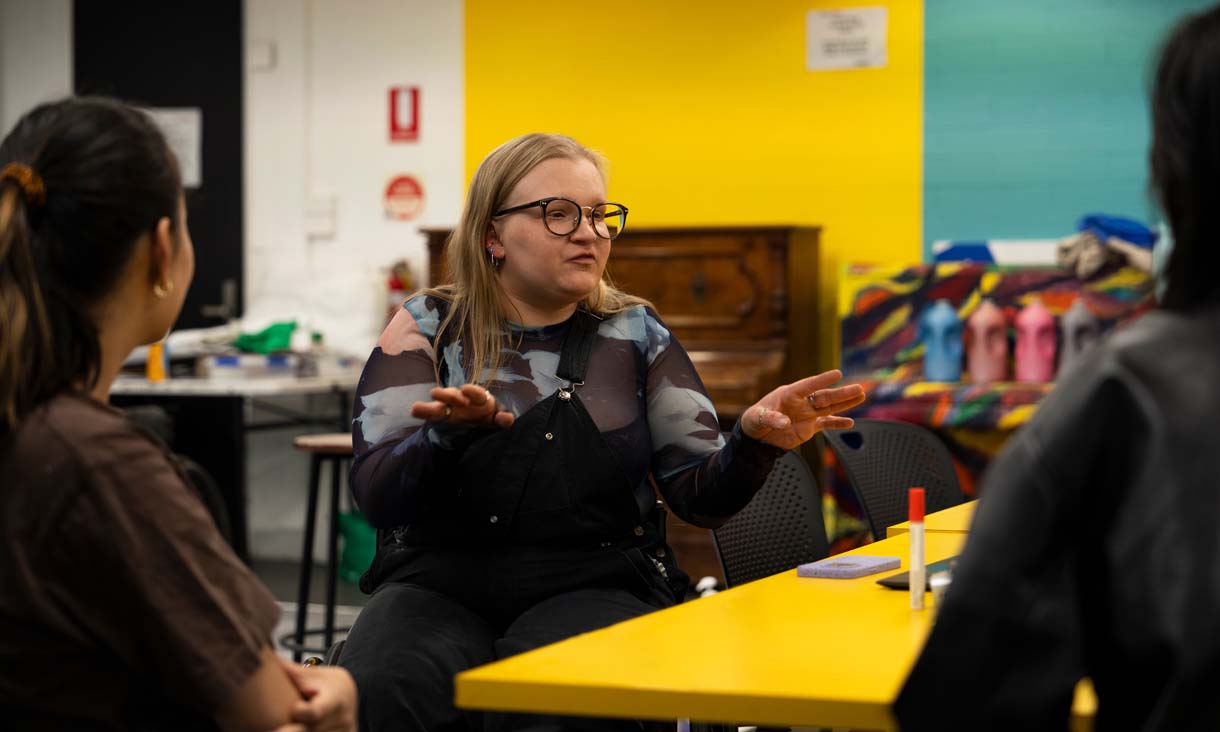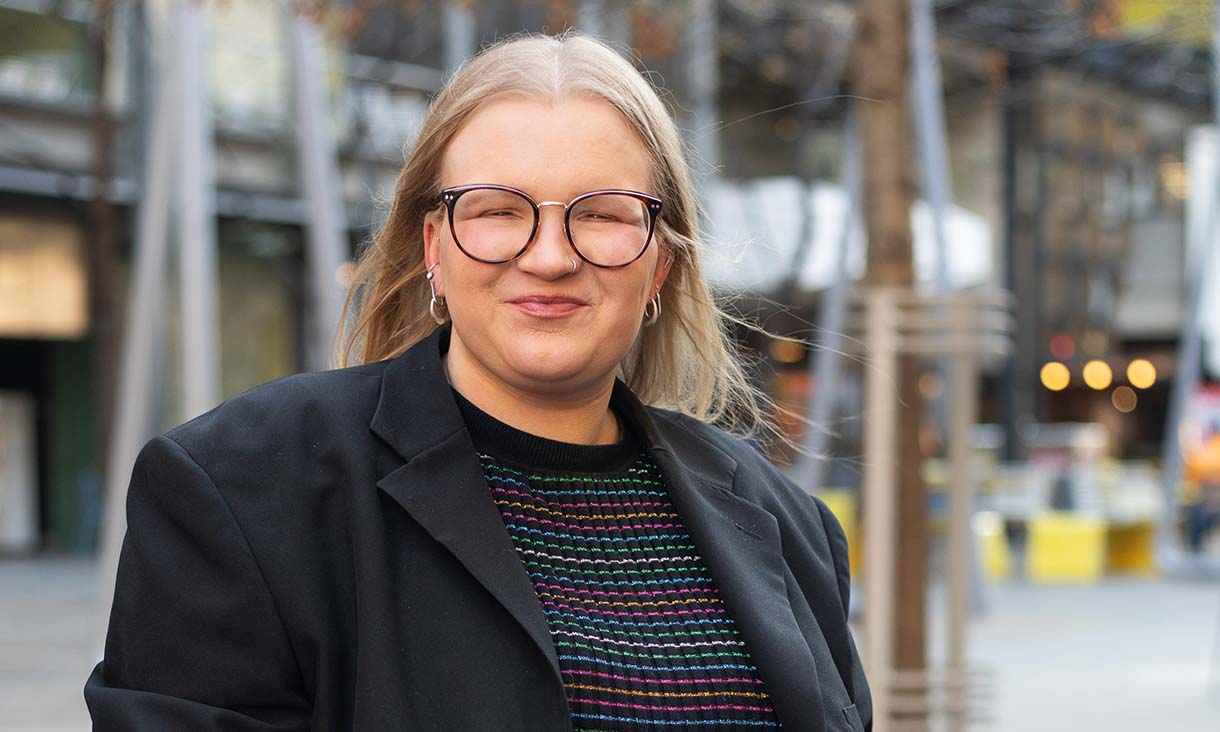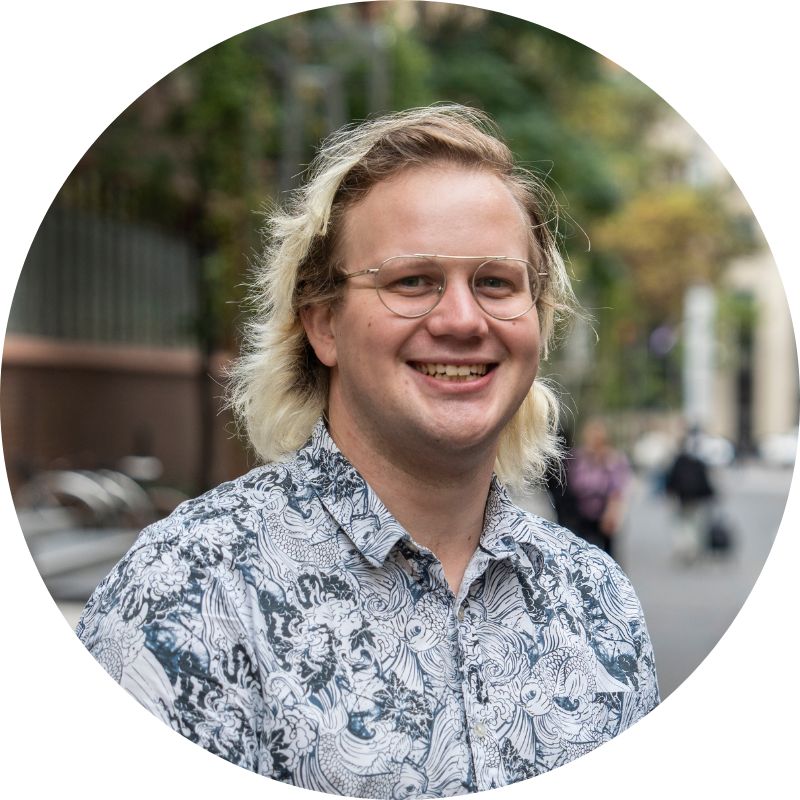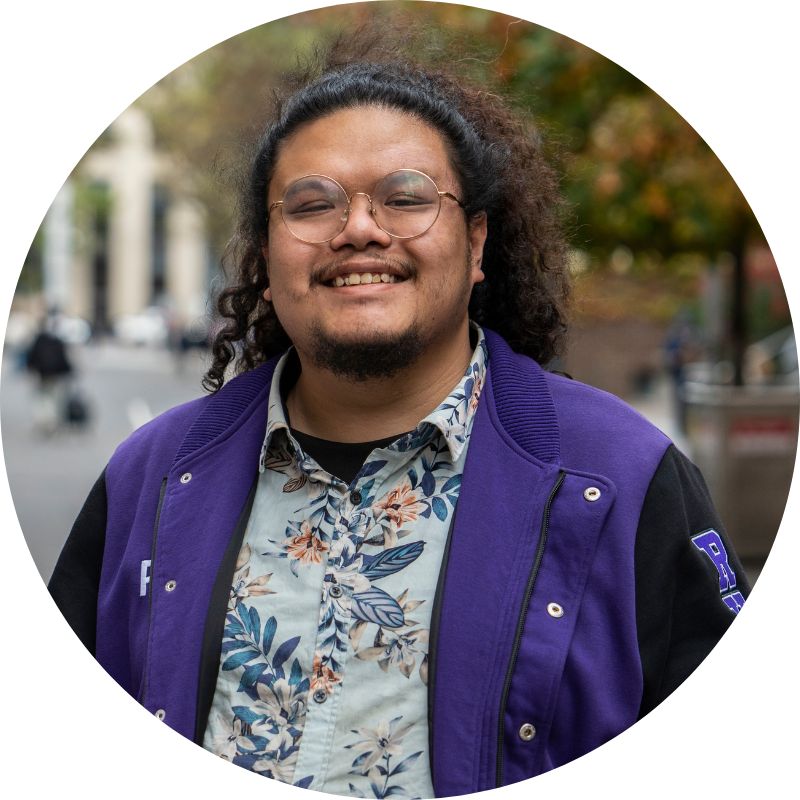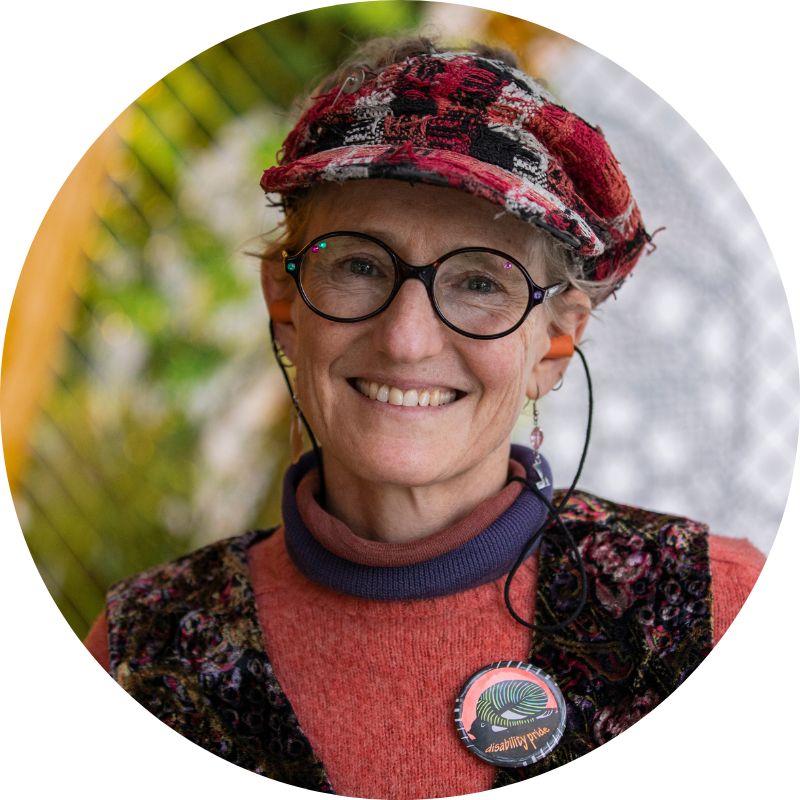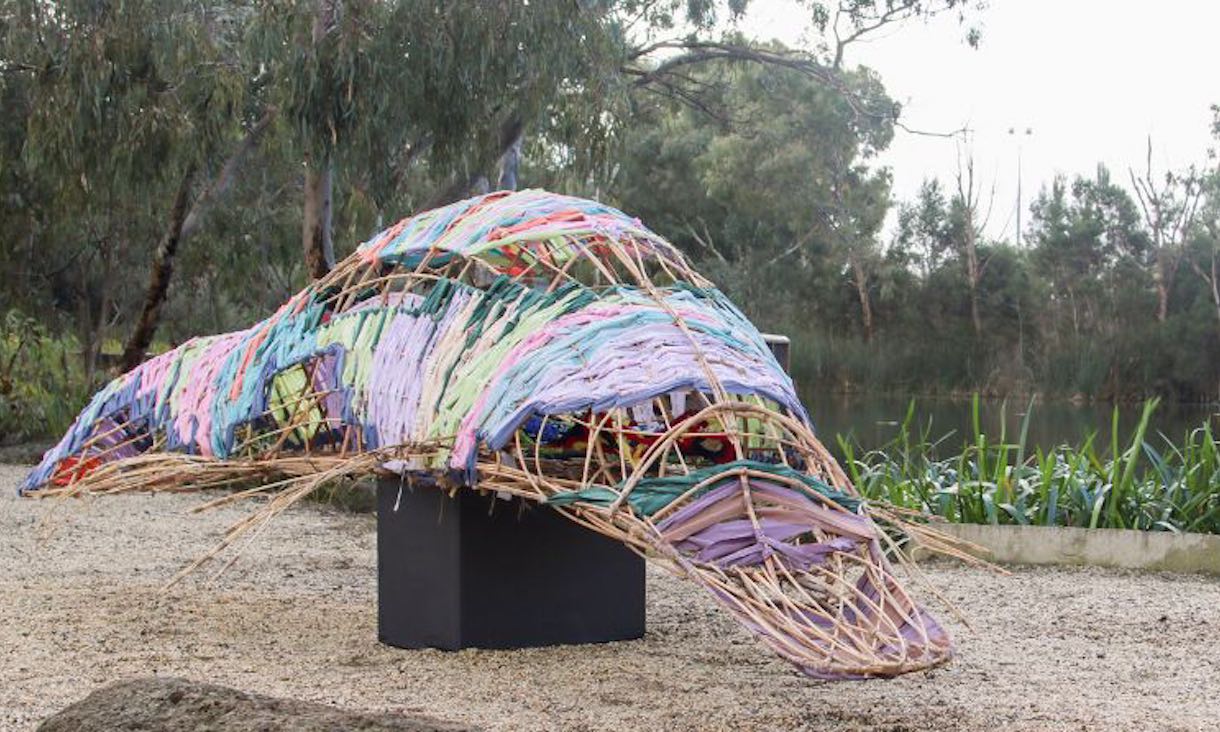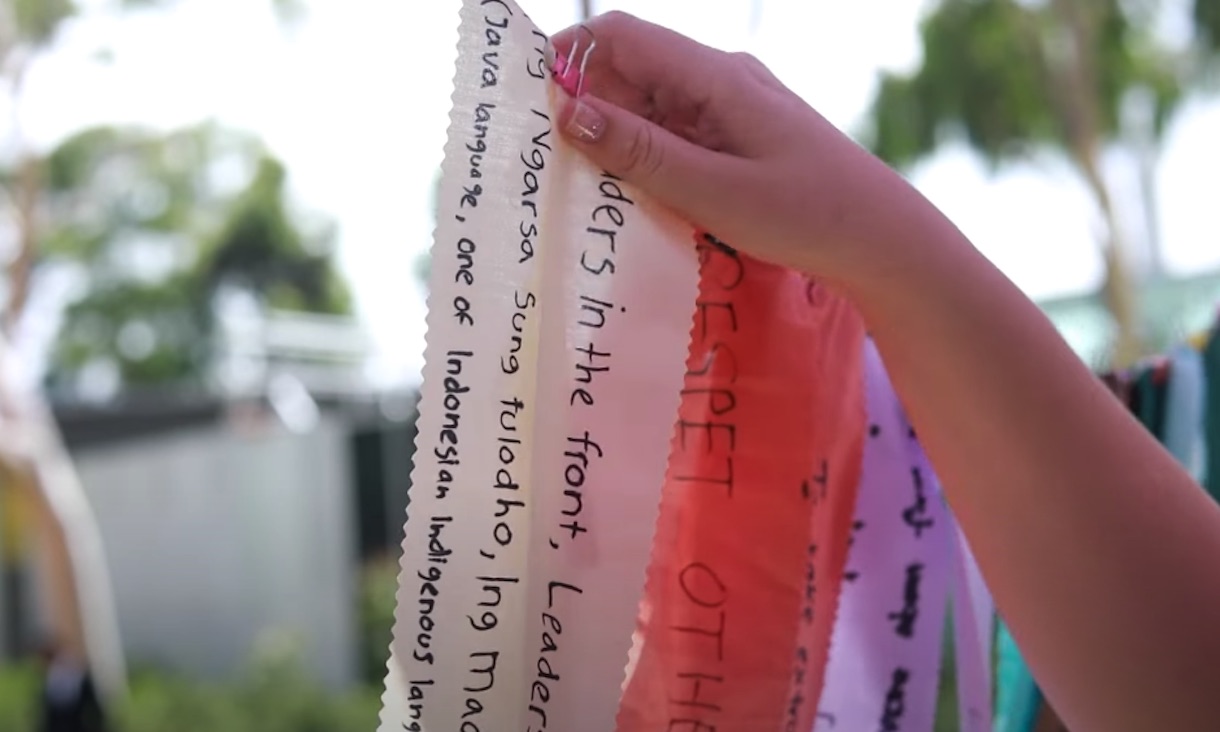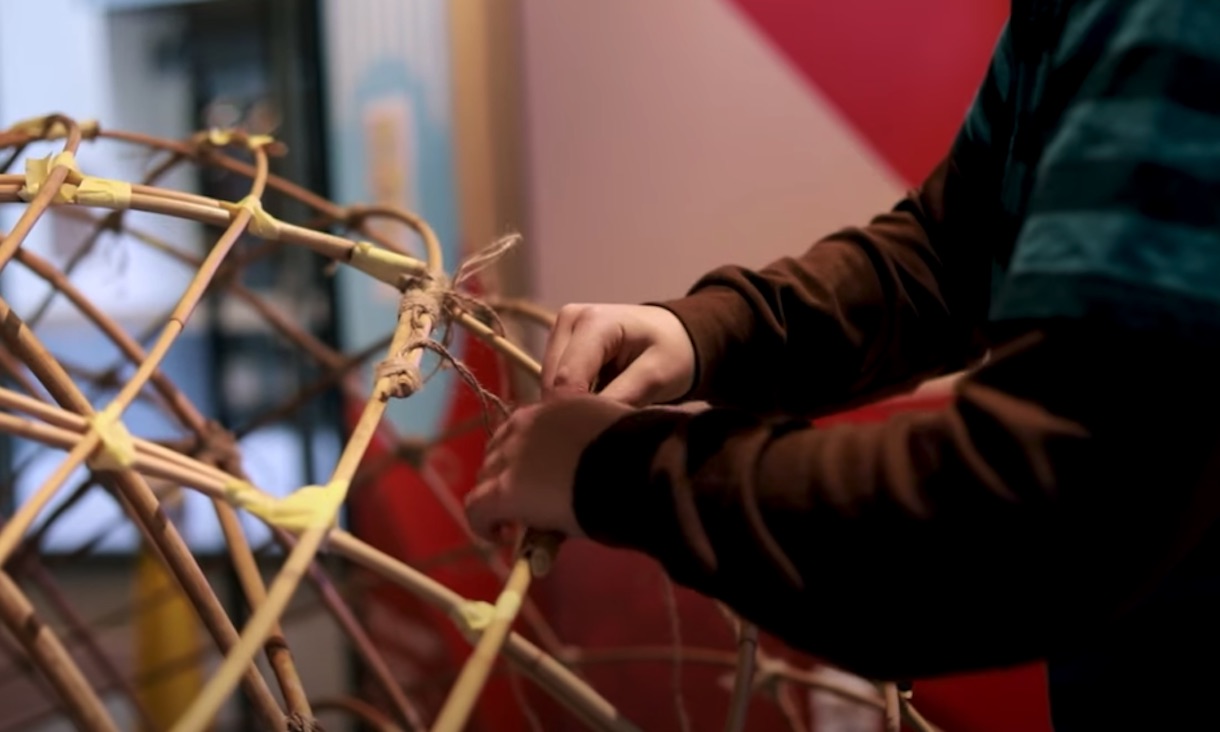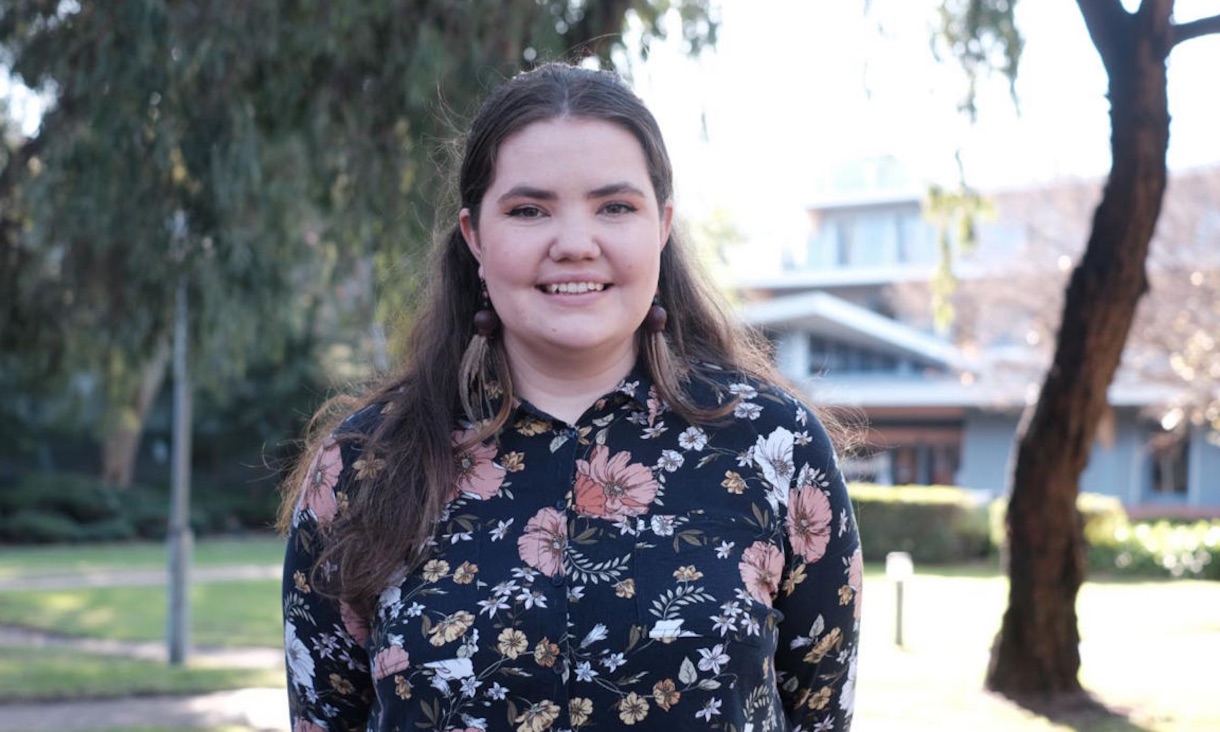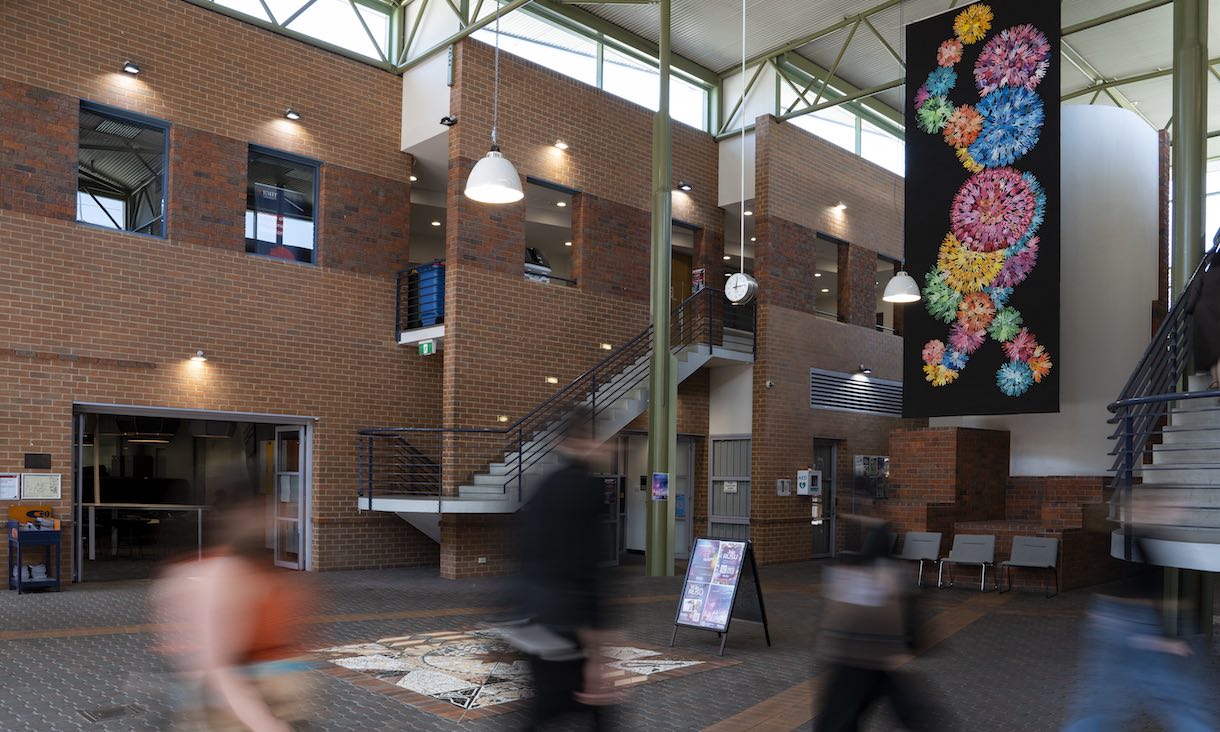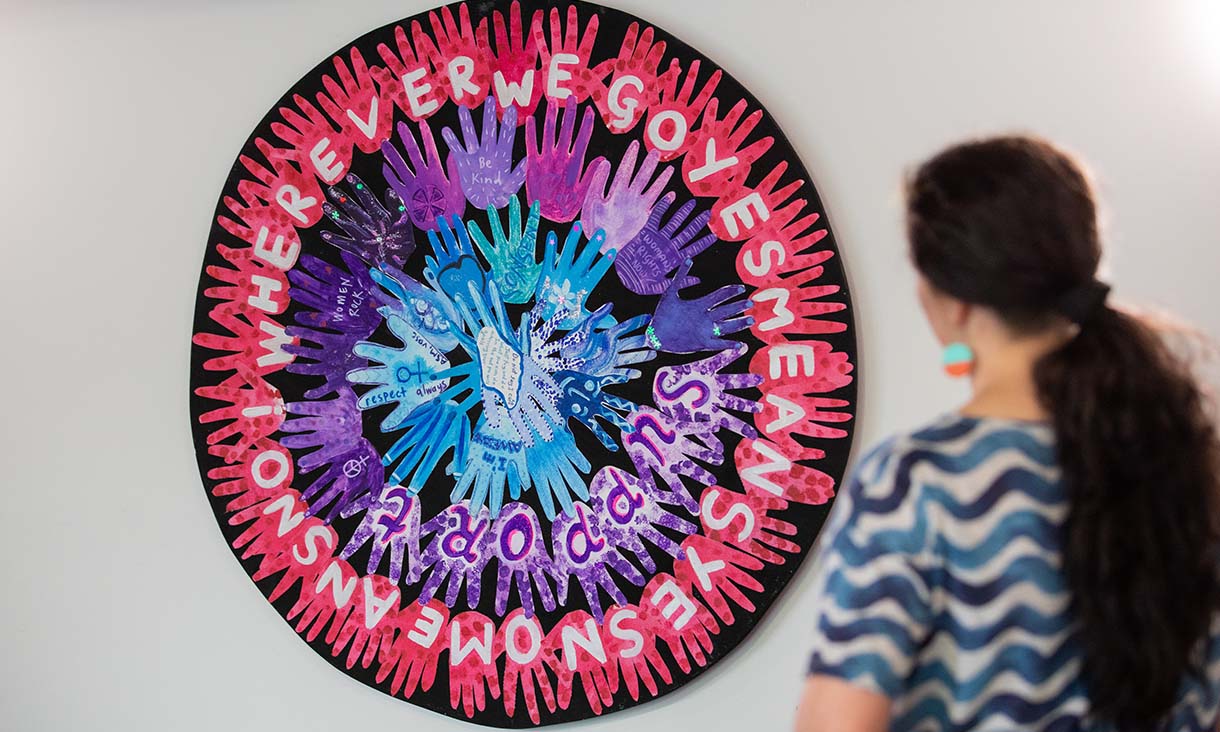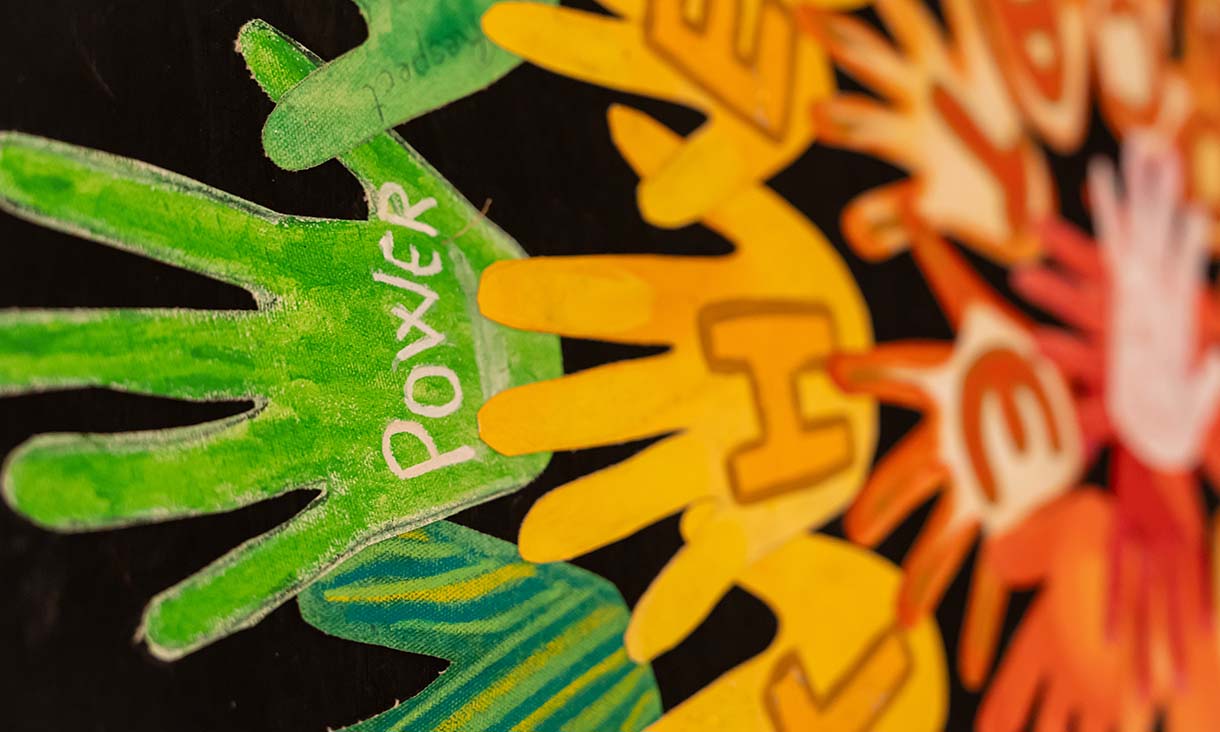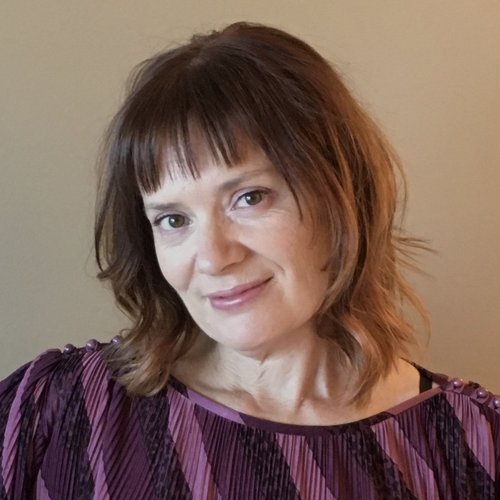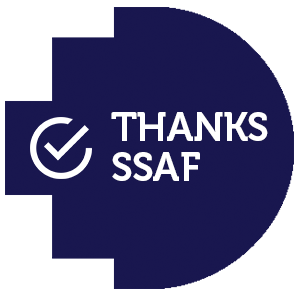DESCRIPTION:
A white background, with the red pixel and blue text of the RMIT University logo, gives way to a woman standing in front of a large window overlooking a garden. She talks to camera. Text: Indianna Hunt, Artist.
Overlay footage shows Indianna Hunt leaning over a stack of documents, splayed out over a table outside. Each document features a colourful image and white text in a dark panel.
INDIANNA HUNT:
Hi, my name is Indianna Hunt. I'm a proud Wemba Wemba, Gunditjmara, Jardwadjali, Wargaia woman. I'm the artist behind the solidarity art project here at RMIT.
DESCRIPTION:
On the table, is a bundle of thin lengths of cane. Indianna Hunt bends the cane and shapes it into a circle. Plastic ties and sticky tape hold the circle in place.
Now inside, others work on the large cane sculpture. It forms a curved, dome-like shape.
Elsewhere, in a busy location at the RMIT campus, others sit at a table outside and sort colourful strips of fabric into piles. Others hang the fabric strips on lengths of string. The fabric strips all feature hand-written text.
Two men sitting by a laptop and microphone talk.
A person scrolls on their phone. An Instagram post from RMIT Creative reads: Design your own platypus! On a tablet, a person uses a program to colour in an animated platypus.
INDIANNA HUNT:
When I was asked to come up with a concept relating to solidarity and inclusion for RMIT for Aboriginal and Torres Strait Islander students, I thought that our story of the Platypus was very fitting because it speaks to ideas of belonging and your identity, and how you can be different but also fit in anywhere that you are.
DESCRIPTION:
A hand drawn-style animation. A decorated platypus swims through a colourful stream of water. It skims along the rocky riverbed. Indianna Hunt walks through an RMIT building. She approaches the animated stream, which is now projected on a wall. She smiles as she watches the platypus, which is now decorated using a different pattern and colours, swim around the projection.
MAPIYAL:
I am Mapiyal, the Platypus. My country is Wemba-Wemba. Here in Naarm, Melbourne, I am called Dulaiwurrung or Wurundjeri and Boonwurrong peoples. My job is to teach us the lesson to be proud of our differences and respect one another, finding where we belong in ourselves.
SPEAKER:
I came from in Medina City in Kingdom of Saudi Arabia.
SPEAKER:
I come from Narrandera on Wiradjuri country.
SPEAKER:
I come from the City of Harbin in Heilongjiang Province, China.
DESCRIPTION:
Indianna Hunt walks along, following yet another decorated platypus as it swims around the projection.
MAPIYAL:
The Journey of Mapiyal is a Wemba-Wemba story passed down through generations that is interwoven as part of a larger story, which travels through different nations.
DESCRIPTION:
Overlay footage shows Indianna Hunt standing with another woman, as they survey a map labelled The AIATSIS map of Indigenous Australia. People use colourful markers to write in numerous languages on the fabric strips. Indianna Hunt talks with a man, who wears a yellow vest featuring the RMIT logo. A person hangs a fabric strip amongst others on a length of string.
INDIANNA HUNT:
Throughout 2022, we have been on the City, Brunswick and Bundoora campuses, having students write pledges to take part in the project. Students were encouraged to write pledges in solidarity with Aboriginal and Torres Strait Islander peoples on campus and in their general life. What kind of steps they can take to better their knowledge, better their understanding, and just be kinder in their everyday life.
DESCRIPTION:
The fabric strips on the string move in the breeze. One pledge reads: Respect & Nurture. Others read: Don’t give up; I pledge to centre local Aboriginal voices in the work I do, and create safe spaces for those who need them; I plan to move from a transactional to a relational model.
Indianna Hunt reels a long length of fabric strip. A person sews shorter strips of like colours of fabric together. Another person weaves a longer length of fabric around the cane sculpture. The strips begin to form a colourful canopy over the top of the sculpture. Inside, yellow, black and red lengths of fabric, amongst other colours, have been woven to form circular shapes.
INDIANNA HUNT:
The pledges have been a bit of a fun process. We have been playing with different ideas of how we can add them to the sculpture, and we've ended up stitching them together and weaving them through the cane. When you peer into the sculpture, you can see the Heart of Mapiyal, which was created in collaboration with Ngarara Willim students here at RMIT.
DESCRIPTION:
Lengths of light blue, pink, green and purple fabric have been woven around two lengths of cane along the side of the sculpture. Singular strips of fabric hang from the top of the sculpture. A group of standing people view the sculpture. Large sections have been covered by the woven lengths of fabric. The sculpture is formed in the shape of a platypus, including webbed feet and a bill, made from cane. A man inspects inside the sculpture by peering through an exposed section of cane.
Text on a plaque reads:
The Journey of Mapiyal (2022).
Bamboo, pehang cane, twine, wire, fabric.
Indianna Hunt.
Wemba Wemba, Gunditjmara, Jardwadjali, Wargaia.
Many students here at RMIT, like me, have come from a long way away, but we are always connected by waterways. I was asked to come up with a concept relating to solidarity, respect, cultural identity, allyship, inclusion and belonging. The story of the mapiyal (platypus in Wemba Wemba language) is very fitting. It speaks to being proud of who you are and where you’ve come from, while also respecting who others are.
Consider where you are along your journey towards solidarity. What would your promise be?
What could you do to be kinder in your everyday life or make sure everyone is included?
The flag wraps symbolise that Aboriginal and Torres Strait Islander people are the heart of RMIT, and our country. They are surrounded and supported by pledges made by students and staff in reflective moments.
Key Collaborators
Indianna Hunt, Lead Artist (Wemba Wemba, Gunditjmara, Jardwadjali, Wargaia)
Mahoney Kiely, Cane & bamboo artist and mentor
Darcy, Israel, Caley, Anjali, Calleen, Winyinar, Fiona, Jesse, Shylicia & Elijah, Flag hearts
Mapiyal has been realised with contributions from RMIT students and staff
Solidarity Art Project is a joint RMIT Student Life and RMIT University Student Union initiative, in consultation with Ngarara Willim. It was championed by Indigenous Officer Kimberley Lovegrove 2020-21, and Shylicia McKernan 2022, to explore notions of solidarity for Aboriginal and Torres Strait Islander communities, and respect for people from all backgrounds to feel safe on campus. Kimba Thompson has been mentor throughout.
The Journey of Mapiyal artwork also includes The Burrow, a multimedia immersive installation which is presented at City Campus between B010-B012. It includes the story of mapiyal shared by Elder Kerry Clarke (Wemba Wemba, Gunditjmara, Jardwadjali, Wergaia)
Logos at the bottom of the plaque: Thanks SSAF, RMIT university Student life, RMIT University Student Union, Ngarara Willim Centre.
Indianna Hunt and three other people carry the sculpture, which is now mostly covered by colourful fabric, with some sections of cane still exposed. Others stand, watching. They lay the sculpture beside a creek. Split-screen footage shows a number of people, including Indianna Hunt, addressing a crowd in front of the sculpture.
INDIANNA HUNT:
Mapiyal being back by the water relates back to the start of the project, and realising that we are all connected by waterways no matter how far away we're from. There's always water that's connecting everywhere.
DESCRIPTION:
The sculpture, mapiyal, rests on a black plinth beside the creek.
Text appears over a series of images of people around the RMIT offices and campus, and an image of the sculpture by the creek:
Indianna Hunt
Lead Artist, Burrow Design, Cane Sculpture
Wemba Wemba, Gunditjmara, Jardwadjali, Wergaia
Elder Kerry Clarke
Story of Mapiyal & The Burrow Voiceover
Wemba Wemba, Gunditjmara, Jardwadjali, Wergaia
Israel Carter
The Burrow Sound Artist
Wemba Wemba, Ngarrindjeri
Kimberly Lovegrove
RUSU Project Champion
Ngarrindjeri
John Power
The Burrow VFX Animation Director
Mahony Kiely
Cane Artist and Collaborator
Darcy, Israel, Caley, Anjali, Calleen, Winyinar, Fiona, Jesse, Shylicia & Elijah
Flag Hearts
Ngarara Willim Community
The Journey of Mapiyal has been realised with contributions from RMIT students and staff
Over a white background, text: Supported By:
Logos: Ngarara Willim Centre, RMIT University Student Life, RMIT University Student Union.
The RMIT pixel envelopes the screen and settles over a blue background. Text: Thanks SSAF. Over a white background, the red pixel and blue text of the RMIT University logo.

